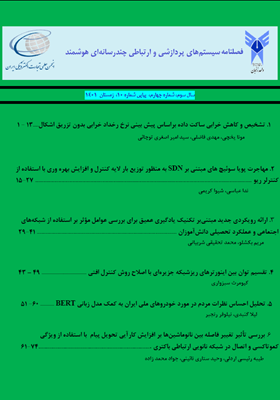تحلیل احساس نظرات مردم در مورد خودروهای ملی ایران به کمک مدل زبانی BERT
محورهای موضوعی : پردازش چند رسانه ای، سیستمهای ارتباطی، سیستمهای هوشمندلیلا گنبدی 1 , نیلوفر رنجبر 2 *
1 - دانشجوی کارشناسی ارشد، گروه مهندسی کامپیوتر، دانشگاه خلیج فارس، بوشهر، ایران
2 - مربی، گروه مهندسی کامپیوتر، دانشگاه خلیج فارس، بوشهر، ایران
کلید واژه: یادگیری ماشین, خودروهای ملی ایران, متنکاوی, برت, تحلیل احساس,
چکیده مقاله :
امروزه با پیشرفت شبکه جهانی اینترنت و توسعه شبکههای اجتماعی، افراد در مورد موضوعات مختلف سیاسی و اقتصادی به تبادل نظر و گفتوگو میپردازند. با استفاده از روشهای متنکاوی میتوان به استخراج اطلاعات از این نظرات پرداخت. یکی از روشهای تحلیل نظرات، تحلیل نظرات مبتنی بر جنبه است که به کمک آن میتوان نظرات مردم را در مورد جنبههای مختلف یک موضوع تحلیل و بررسی کرد. تحلیل نظرات مردم در مورد صنعت خودروسازی و خودروهای ملی یکی از کاربردهای مهم استفاده از روشهای متنکاوی در موضوعات اقتصادی است. این کار باعث مطلع شدن مدیران صنعت خودروسازی از میزان رضایت واقعی مردم از خودروهای ملی است. برای دست یافتن به این مهم روشهای مختلفی ارائه شده است. در این مقاله ما به معرفی روشی برای استخراج جنبههای مختلف مربوط به خودروهای ملی میپردازیم، سپس به کمک مدل زبانی برت برای جملات مختلف، بردار استخراج کرده و پس از آن به کمک شبکه عصبی به دستهبندی آنها میپردازیم. سپس با داشتن جنبههای مختلف مهم برای خودروها و این که نظر مطرح شده به کدام یک از این جنبهها میپردازد و حس مطرح شده در نظر مثبت، منفی یا خنثی است، به تحلیل میزان رضایت مردم از جنبههای مختلف خودروهای ایرانی میپردازیم. هدف نهایی این مقاله تحلیل نظرات مردمی در مورد انواع خودروهای ملی و اجزای آن با هدف بهبود عملکرد خودروسازان است.
Introduction: With the development of the internet and social media, people have been actively discussing political and economic issues, and sharing their opinions online. The vast amount of data generated from these online discussions can be analyzed through text mining methods to extract valuable information. One such method is aspect-based sentiment analysis, which allows for the analysis of people's opinions on various aspects of a topic. In this paper, we will focus on the analysis of people's opinions on the Iranian automobile industry and national cars using aspect-based sentiment analysis.Methodology: To achieve our goal, we first introduce a method for extracting different aspects related to national cars. We then use the "BERT" language model to extract vectors for different sentences related to the various aspects and finally use a neural network to classify the sentiments expressed in these sentences as positive, negative, or neutral.Results: The analysis of public opinions on various aspects of Iranian cars showed that the most discussed aspects were design, quality, and price. The sentiment expressed towards design was largely positive, with people expressing admiration for the unique and modern designs of Iranian cars. The sentiment expressed towards quality was mixed, with some people praising the improved quality of national cars, while others criticized the use of low-quality materials. The sentiment expressed towards price was largely negative, with people complaining about the high prices of Iranian cars compared to their foreign counterparts.Discussion: The results of our analysis provide valuable insights into the level of public satisfaction with various aspects of Iranian cars. The mixed sentiment expressed towards the quality of Iranian cars highlights the need for manufacturers to focus on using high-quality materials to improve the overall quality of their products. The negative sentiment expressed toward the price of Iranian cars suggests that car manufacturers need to find ways to reduce production costs and offer more competitive pricing. In conclusion, aspect-based sentiment analysis can be used as an effective method to analyze public opinions on various aspects of a topic. Our analysis of public opinions on the Iranian automobile industry and national cars provides valuable insights for car manufacturers to improve the design, quality, and pricing of their products. By taking these insights into account, manufacturers can improve their performance and meet the needs and expectations of their customers.
_||_

